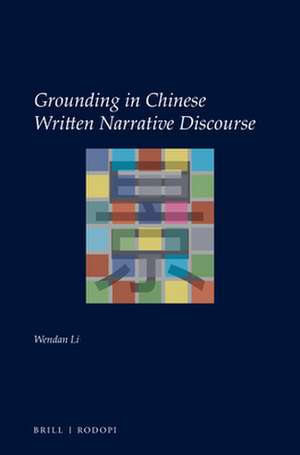Grounding in Chinese Written Narrative Discourse: Utrecht Studies in Language and Communication, cartea 32
Autor Wendan Lien Limba Engleză Paperback – 28 feb 2018
Preț: 452.45 lei
Preț vechi: 532.29 lei
-15% Nou
Puncte Express: 679
Preț estimativ în valută:
86.59€ • 90.06$ • 71.48£
86.59€ • 90.06$ • 71.48£
Carte indisponibilă temporar
Doresc să fiu notificat când acest titlu va fi disponibil:
Se trimite...
Preluare comenzi: 021 569.72.76
Specificații
ISBN-13: 9789004316645
ISBN-10: 9004316647
Pagini: 277
Dimensiuni: 155 x 235 mm
Greutate: 0.41 kg
Editura: Brill
Colecția Brill
Seria Utrecht Studies in Language and Communication
ISBN-10: 9004316647
Pagini: 277
Dimensiuni: 155 x 235 mm
Greutate: 0.41 kg
Editura: Brill
Colecția Brill
Seria Utrecht Studies in Language and Communication
Cuprins
Contents
Preface
List of Tables
List of Figures
Symbols and Glossing Conventions
1 Introduction
1.1 Theoretical Framework
1.2 Methodology
1.3 Organization of the Book
2 Grounding: A Literature Review
2.1 The Notion of Grounding
2.2 Grounding in Linguistics
2.3 Semantic Characteristics of Grounding
2.4 Grammatical Indications of Grounding
2.5 Narrative Discourse and Grounding
2.6 Chapter Summary
3 Grammatical Features of Chinese and Previous Grounding Analysis
3.1 The Important Notion of Topic
3.2 Units in Written Discourse
3.3 Constituent Order
3.4 Indication of Temporal Location
3.5 -Le and Le
3.6 Previous Grounding Analysis of Chinese
3.7 Chapter Summary
4 At the Verb Phrase Core: Foregrounding Through Bounding
4.1 Aspect in Chinese
4.2 Grammatical Aspect Markers and Grounding
4.3 Situation Aspect and Grounding
4.4 Bounded Events and Narrative Advancement
4.5 Chapter Summary
5 In Single-Verb Clauses: Constituent Order and Grounding
5.1 Clause Types Under Examination
5.2 Analysis of Constituent Order and Clause Types
5.3 Statistical Verification
5.4 Discussion
5.5 Chapter Summary
6 In Complex Predicates: Grounding of Verb Phrases
6.1 Serial Verb Constructions
6.2 Multiple Aspectually Marked Verb Phrases
6.3 Discussion
6.4 Chapter Summary
7 In Complex Sentences: Margins Versus Nucleus
7.1 Literature Review: Margins and Subordination
7.2 Adverbial Margins in Chinese
7.3 Discussion: Sentence-Initial Margins With Zero Subject
7.4 Chapter Summary
8 Related Issues
8.1 Coercion in Semantic and Aspectual Reinterpretation
8.2 Interpretations of Postverbal Zai-PPs
8.3 Foregrounding Function of jiu
8.4 Clause Integration and Backgrounding
8.5 Chapter Summary
9 Concluding Remarks
9.1 Major Findings
9.2 Contributions of the Study
9.3 Remaining Issues
References
Sources of Data and Examples
Preface
List of Tables
List of Figures
Symbols and Glossing Conventions
1 Introduction
1.1 Theoretical Framework
1.2 Methodology
1.3 Organization of the Book
2 Grounding: A Literature Review
2.1 The Notion of Grounding
2.2 Grounding in Linguistics
2.3 Semantic Characteristics of Grounding
2.4 Grammatical Indications of Grounding
2.5 Narrative Discourse and Grounding
2.6 Chapter Summary
3 Grammatical Features of Chinese and Previous Grounding Analysis
3.1 The Important Notion of Topic
3.2 Units in Written Discourse
3.3 Constituent Order
3.4 Indication of Temporal Location
3.5 -Le and Le
3.6 Previous Grounding Analysis of Chinese
3.7 Chapter Summary
4 At the Verb Phrase Core: Foregrounding Through Bounding
4.1 Aspect in Chinese
4.2 Grammatical Aspect Markers and Grounding
4.3 Situation Aspect and Grounding
4.4 Bounded Events and Narrative Advancement
4.5 Chapter Summary
5 In Single-Verb Clauses: Constituent Order and Grounding
5.1 Clause Types Under Examination
5.2 Analysis of Constituent Order and Clause Types
5.3 Statistical Verification
5.4 Discussion
5.5 Chapter Summary
6 In Complex Predicates: Grounding of Verb Phrases
6.1 Serial Verb Constructions
6.2 Multiple Aspectually Marked Verb Phrases
6.3 Discussion
6.4 Chapter Summary
7 In Complex Sentences: Margins Versus Nucleus
7.1 Literature Review: Margins and Subordination
7.2 Adverbial Margins in Chinese
7.3 Discussion: Sentence-Initial Margins With Zero Subject
7.4 Chapter Summary
8 Related Issues
8.1 Coercion in Semantic and Aspectual Reinterpretation
8.2 Interpretations of Postverbal Zai-PPs
8.3 Foregrounding Function of jiu
8.4 Clause Integration and Backgrounding
8.5 Chapter Summary
9 Concluding Remarks
9.1 Major Findings
9.2 Contributions of the Study
9.3 Remaining Issues
References
Sources of Data and Examples
Notă biografică
Wendan Li, Ph.D. (1996), is Associate Professor of Chinese Language and Linguistics at the University of North Carolina at Chapel Hill. She has published monographs and articles on Chinese language, discourse structure and pedagogy, including Topic Chains in Chinese (Lincom Europa 2005) and Chinese Writing and Calligraphy (University of Hawai’i Press 2010).
Recenzii
"Taken as a whole, the book is notable in three aspects. First of all, it has considerable significance for typological studies on the grounding phenomenon. [...] Second, as the first study to apply grounding theory in the study of Chinese discourse grammar, this work is both theoretically and methodologically rewarding for Chinese grammar study. [...] Third, the book is user-friendly because it is very well organized." ~ Yurong Zhao, Northeastern University of China, in Chinese Language and Discourse, Vol. 9/2 (2018), pp. 251–255















